Australia's Economic Strategy: BUS502 Report on Recession Avoidance
VerifiedAdded on 2023/04/08
|8
|1599
|234
Report
AI Summary
This report analyzes Australia's economic performance during the Global Financial Crisis (GFC) of 2008, focusing on the strategies that enabled the country to avoid a recession. The report begins by classifying the economist behind the statements as Keynesian, citing the economist's support for income inequality and interventionist policies. It then details how Australia avoided recession, primarily due to the Chinese stimulus and the Rudd government's fiscal measures, including increased government spending and tax breaks. The report emphasizes the role of the mining boom in boosting the Australian economy, affecting GDP components like investments, government consumption, and exports. A comparison between the economic performances of Australia and New Zealand is presented, showing that New Zealand fared worse during the crisis. Finally, the report recommends that Australia maintain its macroeconomic policies, including fiscal stimulus and open trade, to prepare for future recessions, with adjustments as needed. The report concludes by highlighting the effectiveness of these policies in navigating the GFC and suggesting the incorporation of monetary policy to keep interest rates low.
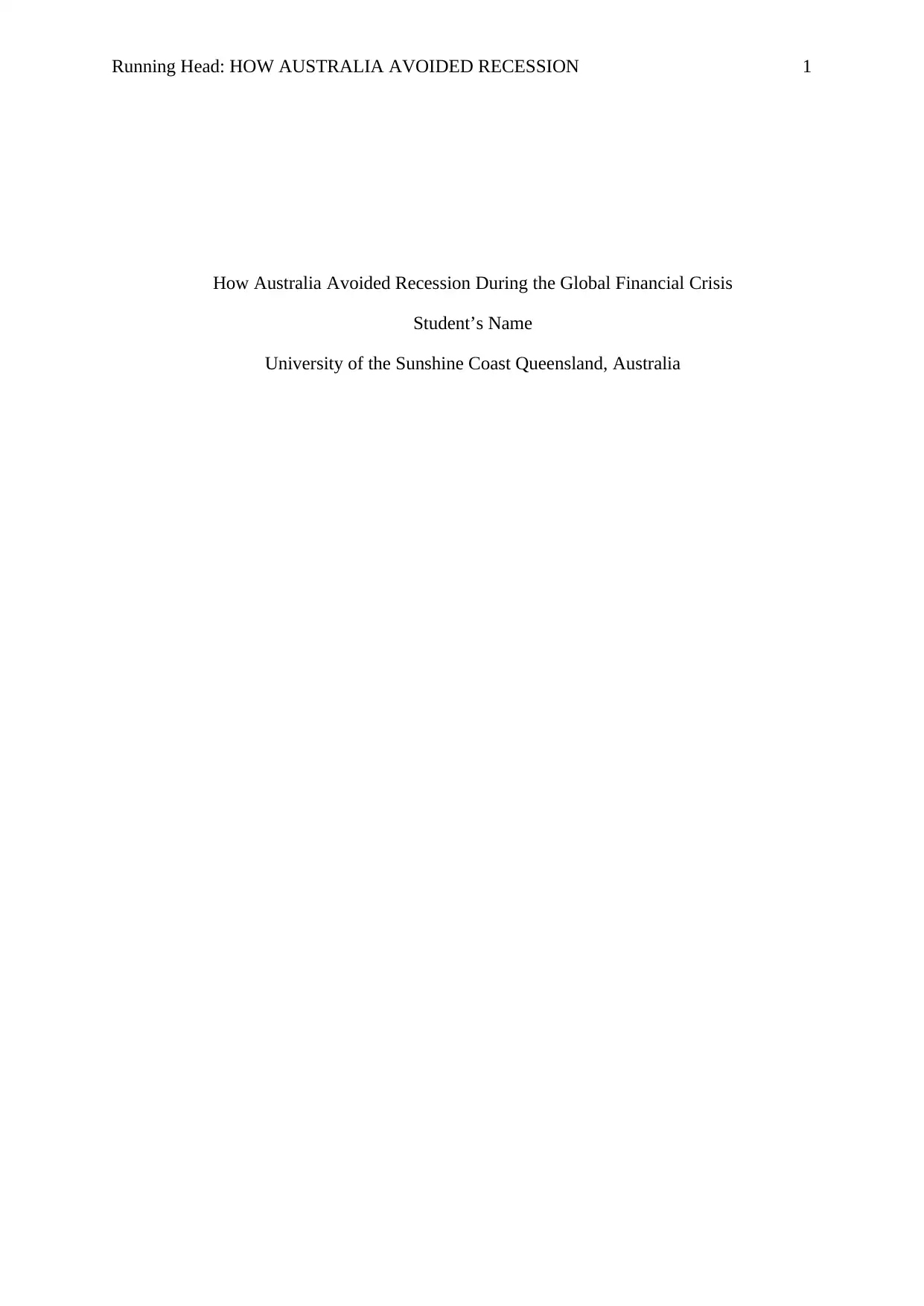
Running Head: HOW AUSTRALIA AVOIDED RECESSION 1
How Australia Avoided Recession During the Global Financial Crisis
Student’s Name
University of the Sunshine Coast Queensland, Australia
How Australia Avoided Recession During the Global Financial Crisis
Student’s Name
University of the Sunshine Coast Queensland, Australia
Paraphrase This Document
Need a fresh take? Get an instant paraphrase of this document with our AI Paraphraser
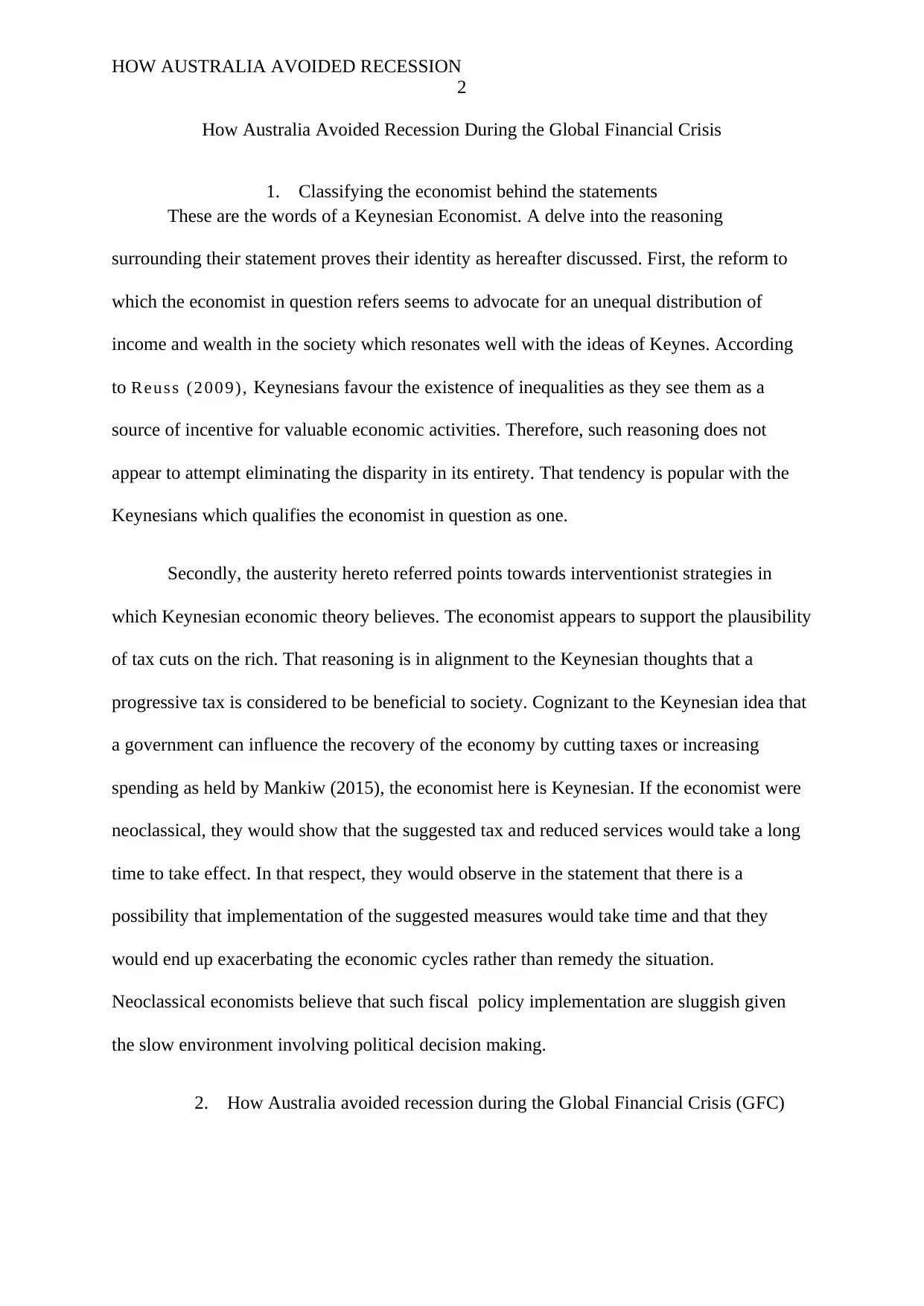
HOW AUSTRALIA AVOIDED RECESSION
2
How Australia Avoided Recession During the Global Financial Crisis
1. Classifying the economist behind the statements
These are the words of a Keynesian Economist. A delve into the reasoning
surrounding their statement proves their identity as hereafter discussed. First, the reform to
which the economist in question refers seems to advocate for an unequal distribution of
income and wealth in the society which resonates well with the ideas of Keynes. According
to Re us s (2 00 9), Keynesians favour the existence of inequalities as they see them as a
source of incentive for valuable economic activities. Therefore, such reasoning does not
appear to attempt eliminating the disparity in its entirety. That tendency is popular with the
Keynesians which qualifies the economist in question as one.
Secondly, the austerity hereto referred points towards interventionist strategies in
which Keynesian economic theory believes. The economist appears to support the plausibility
of tax cuts on the rich. That reasoning is in alignment to the Keynesian thoughts that a
progressive tax is considered to be beneficial to society. Cognizant to the Keynesian idea that
a government can influence the recovery of the economy by cutting taxes or increasing
spending as held by Mankiw (2015), the economist here is Keynesian. If the economist were
neoclassical, they would show that the suggested tax and reduced services would take a long
time to take effect. In that respect, they would observe in the statement that there is a
possibility that implementation of the suggested measures would take time and that they
would end up exacerbating the economic cycles rather than remedy the situation.
Neoclassical economists believe that such fiscal policy implementation are sluggish given
the slow environment involving political decision making.
2. How Australia avoided recession during the Global Financial Crisis (GFC)
2
How Australia Avoided Recession During the Global Financial Crisis
1. Classifying the economist behind the statements
These are the words of a Keynesian Economist. A delve into the reasoning
surrounding their statement proves their identity as hereafter discussed. First, the reform to
which the economist in question refers seems to advocate for an unequal distribution of
income and wealth in the society which resonates well with the ideas of Keynes. According
to Re us s (2 00 9), Keynesians favour the existence of inequalities as they see them as a
source of incentive for valuable economic activities. Therefore, such reasoning does not
appear to attempt eliminating the disparity in its entirety. That tendency is popular with the
Keynesians which qualifies the economist in question as one.
Secondly, the austerity hereto referred points towards interventionist strategies in
which Keynesian economic theory believes. The economist appears to support the plausibility
of tax cuts on the rich. That reasoning is in alignment to the Keynesian thoughts that a
progressive tax is considered to be beneficial to society. Cognizant to the Keynesian idea that
a government can influence the recovery of the economy by cutting taxes or increasing
spending as held by Mankiw (2015), the economist here is Keynesian. If the economist were
neoclassical, they would show that the suggested tax and reduced services would take a long
time to take effect. In that respect, they would observe in the statement that there is a
possibility that implementation of the suggested measures would take time and that they
would end up exacerbating the economic cycles rather than remedy the situation.
Neoclassical economists believe that such fiscal policy implementation are sluggish given
the slow environment involving political decision making.
2. How Australia avoided recession during the Global Financial Crisis (GFC)
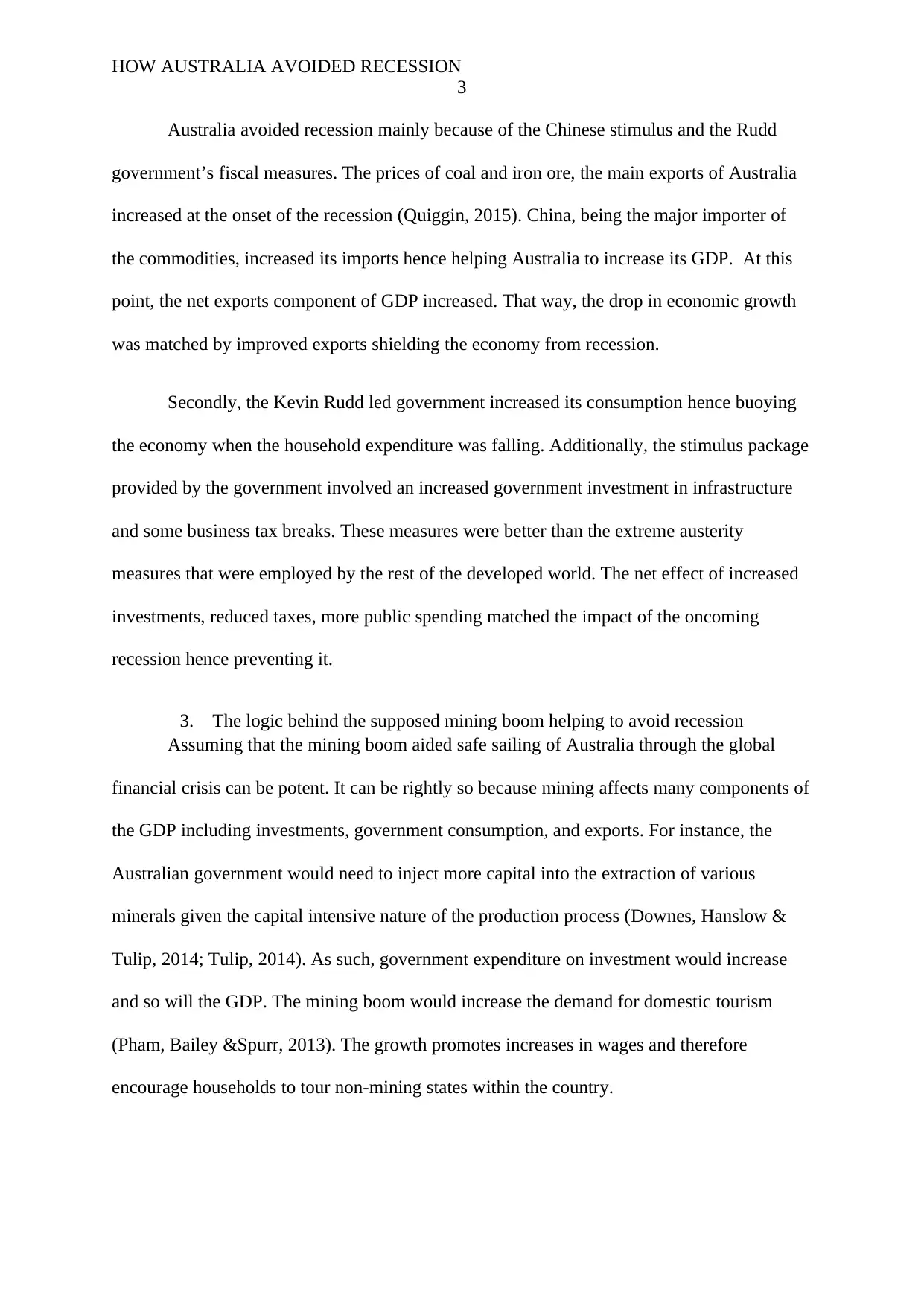
HOW AUSTRALIA AVOIDED RECESSION
3
Australia avoided recession mainly because of the Chinese stimulus and the Rudd
government’s fiscal measures. The prices of coal and iron ore, the main exports of Australia
increased at the onset of the recession (Quiggin, 2015). China, being the major importer of
the commodities, increased its imports hence helping Australia to increase its GDP. At this
point, the net exports component of GDP increased. That way, the drop in economic growth
was matched by improved exports shielding the economy from recession.
Secondly, the Kevin Rudd led government increased its consumption hence buoying
the economy when the household expenditure was falling. Additionally, the stimulus package
provided by the government involved an increased government investment in infrastructure
and some business tax breaks. These measures were better than the extreme austerity
measures that were employed by the rest of the developed world. The net effect of increased
investments, reduced taxes, more public spending matched the impact of the oncoming
recession hence preventing it.
3. The logic behind the supposed mining boom helping to avoid recession
Assuming that the mining boom aided safe sailing of Australia through the global
financial crisis can be potent. It can be rightly so because mining affects many components of
the GDP including investments, government consumption, and exports. For instance, the
Australian government would need to inject more capital into the extraction of various
minerals given the capital intensive nature of the production process (Downes, Hanslow &
Tulip, 2014; Tulip, 2014). As such, government expenditure on investment would increase
and so will the GDP. The mining boom would increase the demand for domestic tourism
(Pham, Bailey &Spurr, 2013). The growth promotes increases in wages and therefore
encourage households to tour non-mining states within the country.
3
Australia avoided recession mainly because of the Chinese stimulus and the Rudd
government’s fiscal measures. The prices of coal and iron ore, the main exports of Australia
increased at the onset of the recession (Quiggin, 2015). China, being the major importer of
the commodities, increased its imports hence helping Australia to increase its GDP. At this
point, the net exports component of GDP increased. That way, the drop in economic growth
was matched by improved exports shielding the economy from recession.
Secondly, the Kevin Rudd led government increased its consumption hence buoying
the economy when the household expenditure was falling. Additionally, the stimulus package
provided by the government involved an increased government investment in infrastructure
and some business tax breaks. These measures were better than the extreme austerity
measures that were employed by the rest of the developed world. The net effect of increased
investments, reduced taxes, more public spending matched the impact of the oncoming
recession hence preventing it.
3. The logic behind the supposed mining boom helping to avoid recession
Assuming that the mining boom aided safe sailing of Australia through the global
financial crisis can be potent. It can be rightly so because mining affects many components of
the GDP including investments, government consumption, and exports. For instance, the
Australian government would need to inject more capital into the extraction of various
minerals given the capital intensive nature of the production process (Downes, Hanslow &
Tulip, 2014; Tulip, 2014). As such, government expenditure on investment would increase
and so will the GDP. The mining boom would increase the demand for domestic tourism
(Pham, Bailey &Spurr, 2013). The growth promotes increases in wages and therefore
encourage households to tour non-mining states within the country.
⊘ This is a preview!⊘
Do you want full access?
Subscribe today to unlock all pages.

Trusted by 1+ million students worldwide
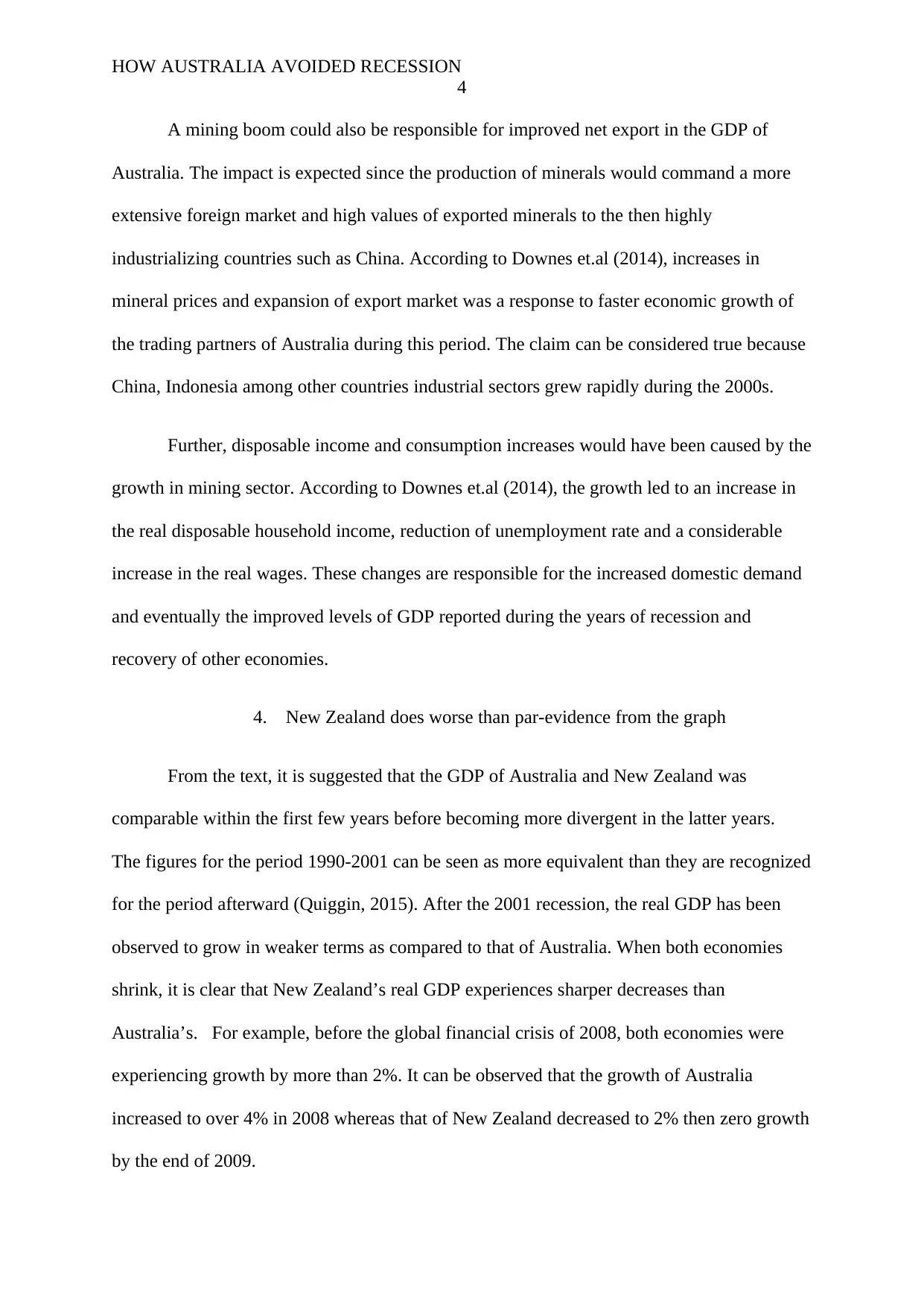
HOW AUSTRALIA AVOIDED RECESSION
4
A mining boom could also be responsible for improved net export in the GDP of
Australia. The impact is expected since the production of minerals would command a more
extensive foreign market and high values of exported minerals to the then highly
industrializing countries such as China. According to Downes et.al (2014), increases in
mineral prices and expansion of export market was a response to faster economic growth of
the trading partners of Australia during this period. The claim can be considered true because
China, Indonesia among other countries industrial sectors grew rapidly during the 2000s.
Further, disposable income and consumption increases would have been caused by the
growth in mining sector. According to Downes et.al (2014), the growth led to an increase in
the real disposable household income, reduction of unemployment rate and a considerable
increase in the real wages. These changes are responsible for the increased domestic demand
and eventually the improved levels of GDP reported during the years of recession and
recovery of other economies.
4. New Zealand does worse than par-evidence from the graph
From the text, it is suggested that the GDP of Australia and New Zealand was
comparable within the first few years before becoming more divergent in the latter years.
The figures for the period 1990-2001 can be seen as more equivalent than they are recognized
for the period afterward (Quiggin, 2015). After the 2001 recession, the real GDP has been
observed to grow in weaker terms as compared to that of Australia. When both economies
shrink, it is clear that New Zealand’s real GDP experiences sharper decreases than
Australia’s. For example, before the global financial crisis of 2008, both economies were
experiencing growth by more than 2%. It can be observed that the growth of Australia
increased to over 4% in 2008 whereas that of New Zealand decreased to 2% then zero growth
by the end of 2009.
4
A mining boom could also be responsible for improved net export in the GDP of
Australia. The impact is expected since the production of minerals would command a more
extensive foreign market and high values of exported minerals to the then highly
industrializing countries such as China. According to Downes et.al (2014), increases in
mineral prices and expansion of export market was a response to faster economic growth of
the trading partners of Australia during this period. The claim can be considered true because
China, Indonesia among other countries industrial sectors grew rapidly during the 2000s.
Further, disposable income and consumption increases would have been caused by the
growth in mining sector. According to Downes et.al (2014), the growth led to an increase in
the real disposable household income, reduction of unemployment rate and a considerable
increase in the real wages. These changes are responsible for the increased domestic demand
and eventually the improved levels of GDP reported during the years of recession and
recovery of other economies.
4. New Zealand does worse than par-evidence from the graph
From the text, it is suggested that the GDP of Australia and New Zealand was
comparable within the first few years before becoming more divergent in the latter years.
The figures for the period 1990-2001 can be seen as more equivalent than they are recognized
for the period afterward (Quiggin, 2015). After the 2001 recession, the real GDP has been
observed to grow in weaker terms as compared to that of Australia. When both economies
shrink, it is clear that New Zealand’s real GDP experiences sharper decreases than
Australia’s. For example, before the global financial crisis of 2008, both economies were
experiencing growth by more than 2%. It can be observed that the growth of Australia
increased to over 4% in 2008 whereas that of New Zealand decreased to 2% then zero growth
by the end of 2009.
Paraphrase This Document
Need a fresh take? Get an instant paraphrase of this document with our AI Paraphraser
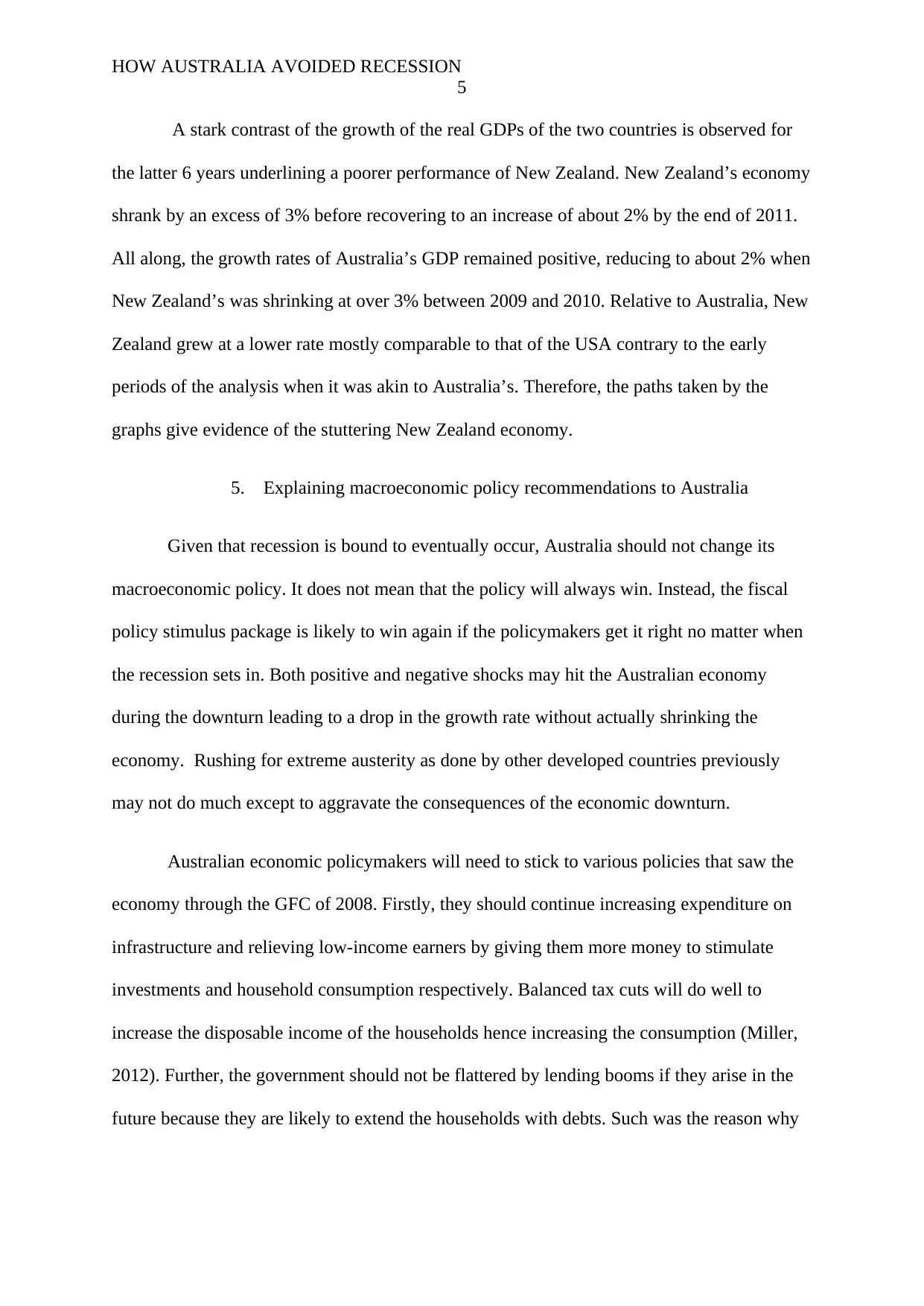
HOW AUSTRALIA AVOIDED RECESSION
5
A stark contrast of the growth of the real GDPs of the two countries is observed for
the latter 6 years underlining a poorer performance of New Zealand. New Zealand’s economy
shrank by an excess of 3% before recovering to an increase of about 2% by the end of 2011.
All along, the growth rates of Australia’s GDP remained positive, reducing to about 2% when
New Zealand’s was shrinking at over 3% between 2009 and 2010. Relative to Australia, New
Zealand grew at a lower rate mostly comparable to that of the USA contrary to the early
periods of the analysis when it was akin to Australia’s. Therefore, the paths taken by the
graphs give evidence of the stuttering New Zealand economy.
5. Explaining macroeconomic policy recommendations to Australia
Given that recession is bound to eventually occur, Australia should not change its
macroeconomic policy. It does not mean that the policy will always win. Instead, the fiscal
policy stimulus package is likely to win again if the policymakers get it right no matter when
the recession sets in. Both positive and negative shocks may hit the Australian economy
during the downturn leading to a drop in the growth rate without actually shrinking the
economy. Rushing for extreme austerity as done by other developed countries previously
may not do much except to aggravate the consequences of the economic downturn.
Australian economic policymakers will need to stick to various policies that saw the
economy through the GFC of 2008. Firstly, they should continue increasing expenditure on
infrastructure and relieving low-income earners by giving them more money to stimulate
investments and household consumption respectively. Balanced tax cuts will do well to
increase the disposable income of the households hence increasing the consumption (Miller,
2012). Further, the government should not be flattered by lending booms if they arise in the
future because they are likely to extend the households with debts. Such was the reason why
5
A stark contrast of the growth of the real GDPs of the two countries is observed for
the latter 6 years underlining a poorer performance of New Zealand. New Zealand’s economy
shrank by an excess of 3% before recovering to an increase of about 2% by the end of 2011.
All along, the growth rates of Australia’s GDP remained positive, reducing to about 2% when
New Zealand’s was shrinking at over 3% between 2009 and 2010. Relative to Australia, New
Zealand grew at a lower rate mostly comparable to that of the USA contrary to the early
periods of the analysis when it was akin to Australia’s. Therefore, the paths taken by the
graphs give evidence of the stuttering New Zealand economy.
5. Explaining macroeconomic policy recommendations to Australia
Given that recession is bound to eventually occur, Australia should not change its
macroeconomic policy. It does not mean that the policy will always win. Instead, the fiscal
policy stimulus package is likely to win again if the policymakers get it right no matter when
the recession sets in. Both positive and negative shocks may hit the Australian economy
during the downturn leading to a drop in the growth rate without actually shrinking the
economy. Rushing for extreme austerity as done by other developed countries previously
may not do much except to aggravate the consequences of the economic downturn.
Australian economic policymakers will need to stick to various policies that saw the
economy through the GFC of 2008. Firstly, they should continue increasing expenditure on
infrastructure and relieving low-income earners by giving them more money to stimulate
investments and household consumption respectively. Balanced tax cuts will do well to
increase the disposable income of the households hence increasing the consumption (Miller,
2012). Further, the government should not be flattered by lending booms if they arise in the
future because they are likely to extend the households with debts. Such was the reason why
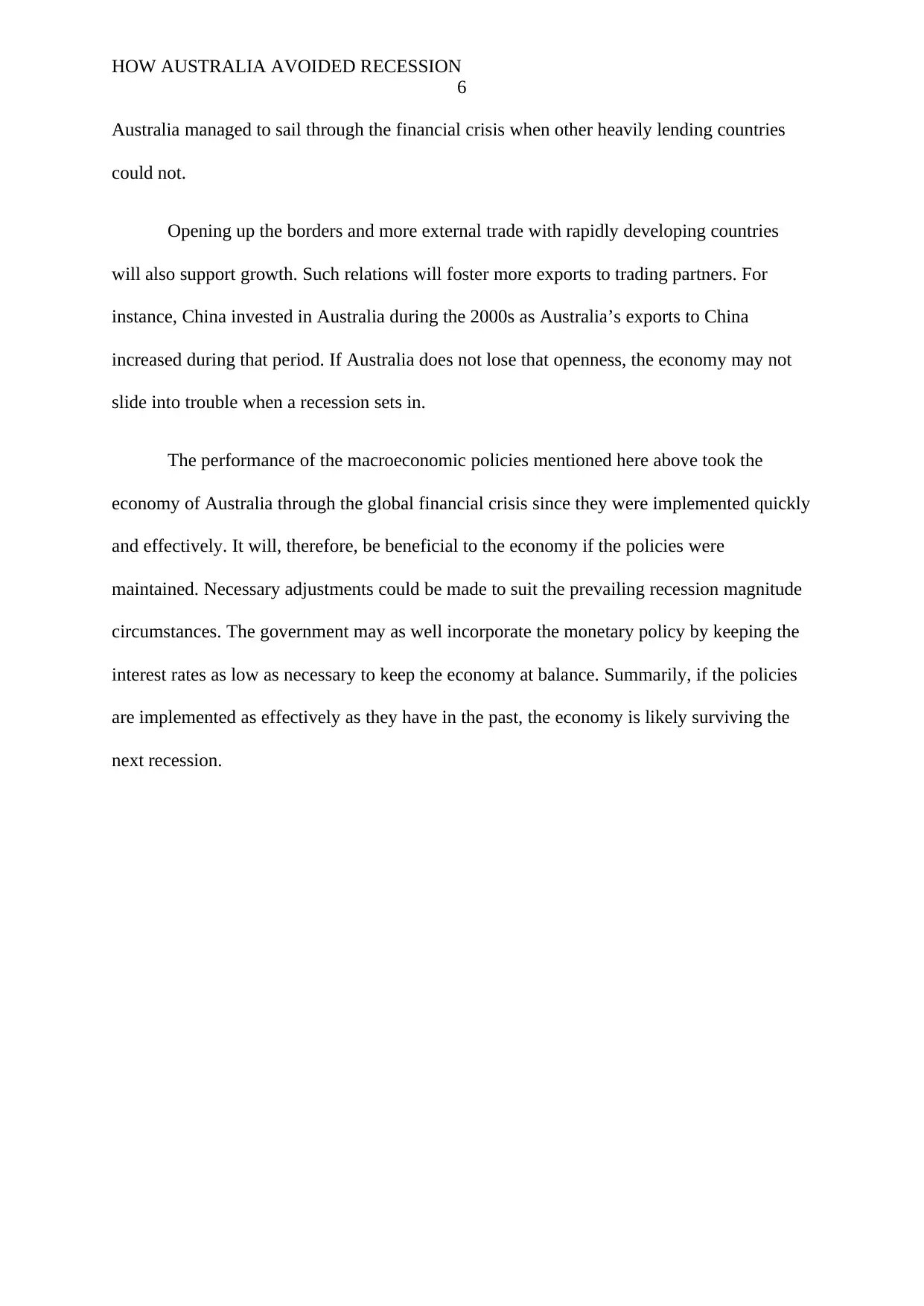
HOW AUSTRALIA AVOIDED RECESSION
6
Australia managed to sail through the financial crisis when other heavily lending countries
could not.
Opening up the borders and more external trade with rapidly developing countries
will also support growth. Such relations will foster more exports to trading partners. For
instance, China invested in Australia during the 2000s as Australia’s exports to China
increased during that period. If Australia does not lose that openness, the economy may not
slide into trouble when a recession sets in.
The performance of the macroeconomic policies mentioned here above took the
economy of Australia through the global financial crisis since they were implemented quickly
and effectively. It will, therefore, be beneficial to the economy if the policies were
maintained. Necessary adjustments could be made to suit the prevailing recession magnitude
circumstances. The government may as well incorporate the monetary policy by keeping the
interest rates as low as necessary to keep the economy at balance. Summarily, if the policies
are implemented as effectively as they have in the past, the economy is likely surviving the
next recession.
6
Australia managed to sail through the financial crisis when other heavily lending countries
could not.
Opening up the borders and more external trade with rapidly developing countries
will also support growth. Such relations will foster more exports to trading partners. For
instance, China invested in Australia during the 2000s as Australia’s exports to China
increased during that period. If Australia does not lose that openness, the economy may not
slide into trouble when a recession sets in.
The performance of the macroeconomic policies mentioned here above took the
economy of Australia through the global financial crisis since they were implemented quickly
and effectively. It will, therefore, be beneficial to the economy if the policies were
maintained. Necessary adjustments could be made to suit the prevailing recession magnitude
circumstances. The government may as well incorporate the monetary policy by keeping the
interest rates as low as necessary to keep the economy at balance. Summarily, if the policies
are implemented as effectively as they have in the past, the economy is likely surviving the
next recession.
⊘ This is a preview!⊘
Do you want full access?
Subscribe today to unlock all pages.

Trusted by 1+ million students worldwide
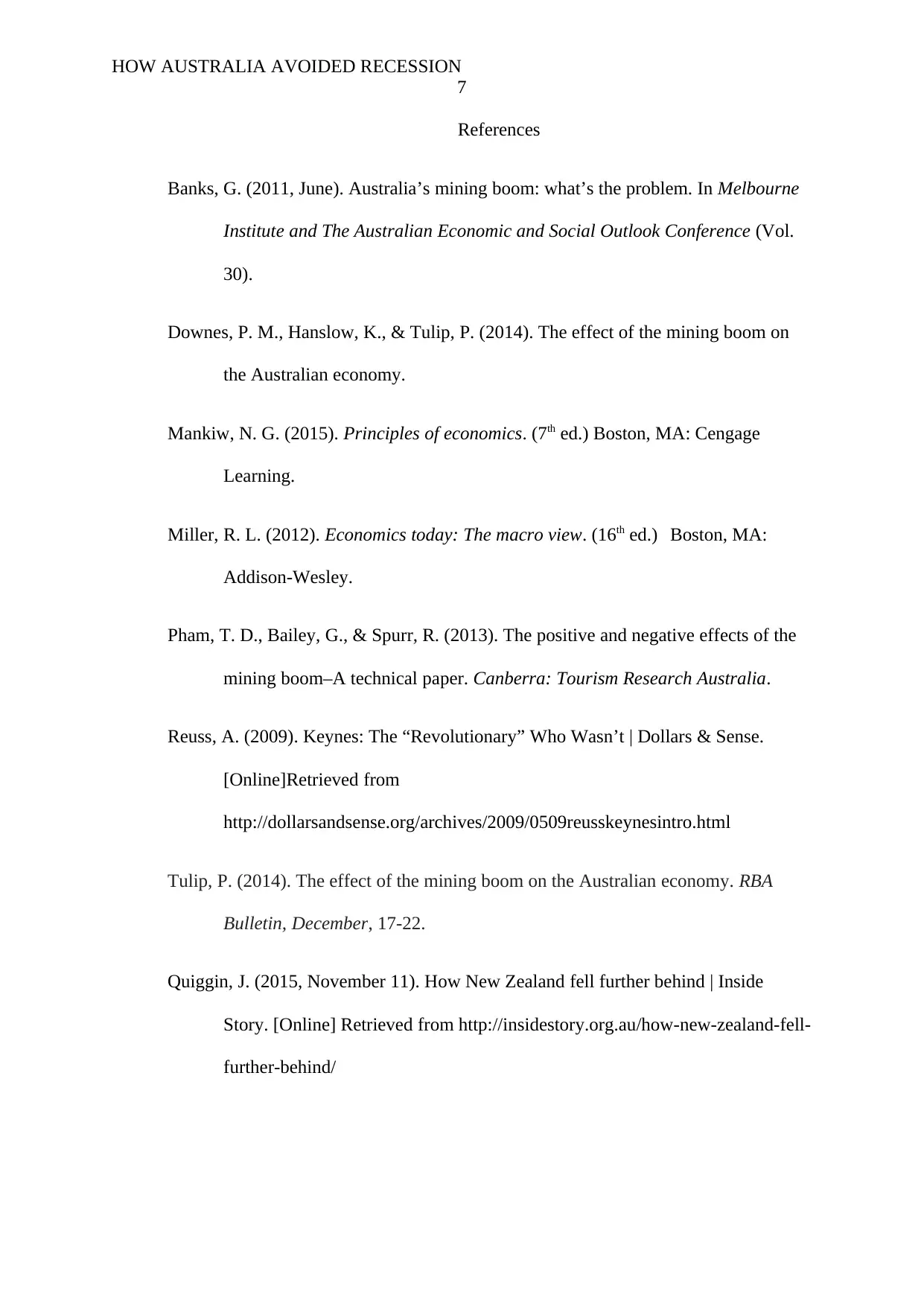
HOW AUSTRALIA AVOIDED RECESSION
7
References
Banks, G. (2011, June). Australia’s mining boom: what’s the problem. In Melbourne
Institute and The Australian Economic and Social Outlook Conference (Vol.
30).
Downes, P. M., Hanslow, K., & Tulip, P. (2014). The effect of the mining boom on
the Australian economy.
Mankiw, N. G. (2015). Principles of economics. (7th ed.) Boston, MA: Cengage
Learning.
Miller, R. L. (2012). Economics today: The macro view. (16th ed.) Boston, MA:
Addison-Wesley.
Pham, T. D., Bailey, G., & Spurr, R. (2013). The positive and negative effects of the
mining boom–A technical paper. Canberra: Tourism Research Australia.
Reuss, A. (2009). Keynes: The “Revolutionary” Who Wasn’t | Dollars & Sense.
[Online]Retrieved from
http://dollarsandsense.org/archives/2009/0509reusskeynesintro.html
Tulip, P. (2014). The effect of the mining boom on the Australian economy. RBA
Bulletin, December, 17-22.
Quiggin, J. (2015, November 11). How New Zealand fell further behind | Inside
Story. [Online] Retrieved from http://insidestory.org.au/how-new-zealand-fell-
further-behind/
7
References
Banks, G. (2011, June). Australia’s mining boom: what’s the problem. In Melbourne
Institute and The Australian Economic and Social Outlook Conference (Vol.
30).
Downes, P. M., Hanslow, K., & Tulip, P. (2014). The effect of the mining boom on
the Australian economy.
Mankiw, N. G. (2015). Principles of economics. (7th ed.) Boston, MA: Cengage
Learning.
Miller, R. L. (2012). Economics today: The macro view. (16th ed.) Boston, MA:
Addison-Wesley.
Pham, T. D., Bailey, G., & Spurr, R. (2013). The positive and negative effects of the
mining boom–A technical paper. Canberra: Tourism Research Australia.
Reuss, A. (2009). Keynes: The “Revolutionary” Who Wasn’t | Dollars & Sense.
[Online]Retrieved from
http://dollarsandsense.org/archives/2009/0509reusskeynesintro.html
Tulip, P. (2014). The effect of the mining boom on the Australian economy. RBA
Bulletin, December, 17-22.
Quiggin, J. (2015, November 11). How New Zealand fell further behind | Inside
Story. [Online] Retrieved from http://insidestory.org.au/how-new-zealand-fell-
further-behind/
Paraphrase This Document
Need a fresh take? Get an instant paraphrase of this document with our AI Paraphraser
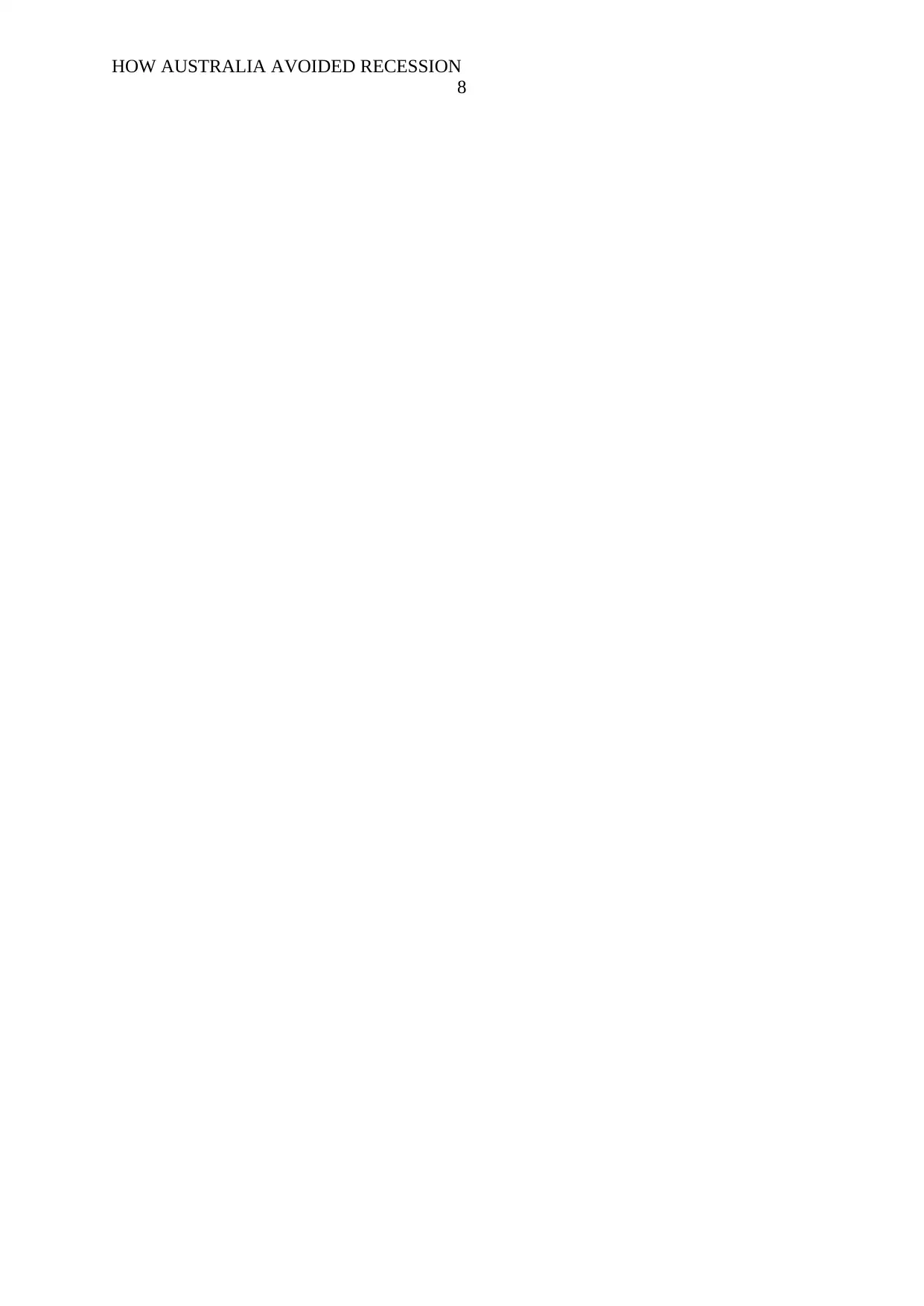
HOW AUSTRALIA AVOIDED RECESSION
8
8
1 out of 8
Related Documents
Your All-in-One AI-Powered Toolkit for Academic Success.
+13062052269
info@desklib.com
Available 24*7 on WhatsApp / Email
![[object Object]](/_next/static/media/star-bottom.7253800d.svg)
Unlock your academic potential
Copyright © 2020–2025 A2Z Services. All Rights Reserved. Developed and managed by ZUCOL.




